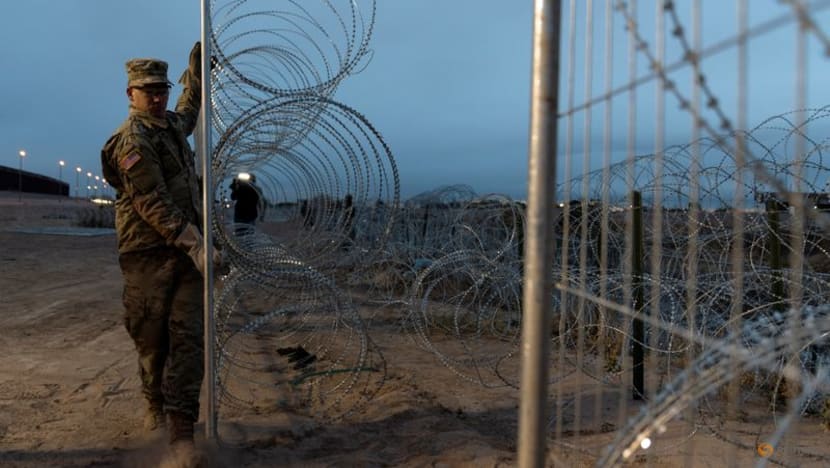US military preparing to send additional 1,500 troops to border

WASHINGTON: The US military will send 1,500 additional active-duty troops to the border with Mexico, the White House said on Wednesday (Jan 22), just two days after President Donald Trump signed an executive order on immigration.
The additional troops would be joining the roughly 2,200 active-duty and thousands of National Guard troops already on the border.
During his first term, Republican Trump ordered 5,200 troops to help secure the border with Mexico. Democratic former President Joe Biden deployed active-duty troops to the border as well.
"This comes off of (Trump's) day one action ... to direct the Department of Defense to make homeland security a core mission of the agency," White House spokesperson Karoline Leavitt told reporters.
A separate official, speaking on the condition of anonymity, said there had been informal discussions about sending as many as 10,000 troops over time. But, the official said, the troop numbers would depend on several factors, including impact on military readiness and what the Department for Homeland Security requests.
The official added that US military aircraft could also be used to deport migrants, but that had not yet been approved.
His Jan 20 executive order instructed the Pentagon to send as many troops as necessary to obtain "complete operational control of the southern border of the United States".
"Within 90 days, the heads of the Defense Department and Department of Homeland Security will need to recommend whether additional actions, including invoking the Insurrection Act of 1807, might be necessary," it said.
Trump recaptured the White House after promising to intensify border security and deport record numbers of migrants. He criticised Biden for high levels of illegal immigration, although the number of migrants caught crossing illegally had already begun to fall dramatically after Biden toughened his policies last year and Mexico stepped up enforcement.
It said another key area was the maritime border between Texas and Mexico in the "Gulf of America".
Trump has said he wants to change the name of the Gulf of Mexico to the Gulf of America.
WORKFORCE COULD BE AFFECTED: EXPERT
Despite the legal and logistical challenges of Trump's mass deportation plan, he could conceivably achieve what former president Barack Obama did in 2013 when he deported about 460,000 illegal migrants, said Jon Lieber, US managing director at political risk consultancy Eurasia Group.
Lieber noted that additional federal resources will be dedicated to the task to identify and deport those living in the US without authorisation.
"I think it's only a matter of probably days or weeks before we start seeing the first types of large-scale and dramatic raids that will round up some of these illegal migrants," he added.
He also pointed out that Trump's move to make migrants apply for asylum outside the US will "dramatically reduce" the numbers coming in, and have a "potentially dramatic effect" on the workforce.
"If you look at where labour force growth has been coming from over the last several years, millions of new migrants (have been) coming in and that's one of the things that's helped combat wage inflation over the end of the Biden administration. So we would expect that to start to reverse in the coming months," Lieber said.
"That could lead to some inflationary pressures in the US, which, of course, will be another political challenge for President Trump."















